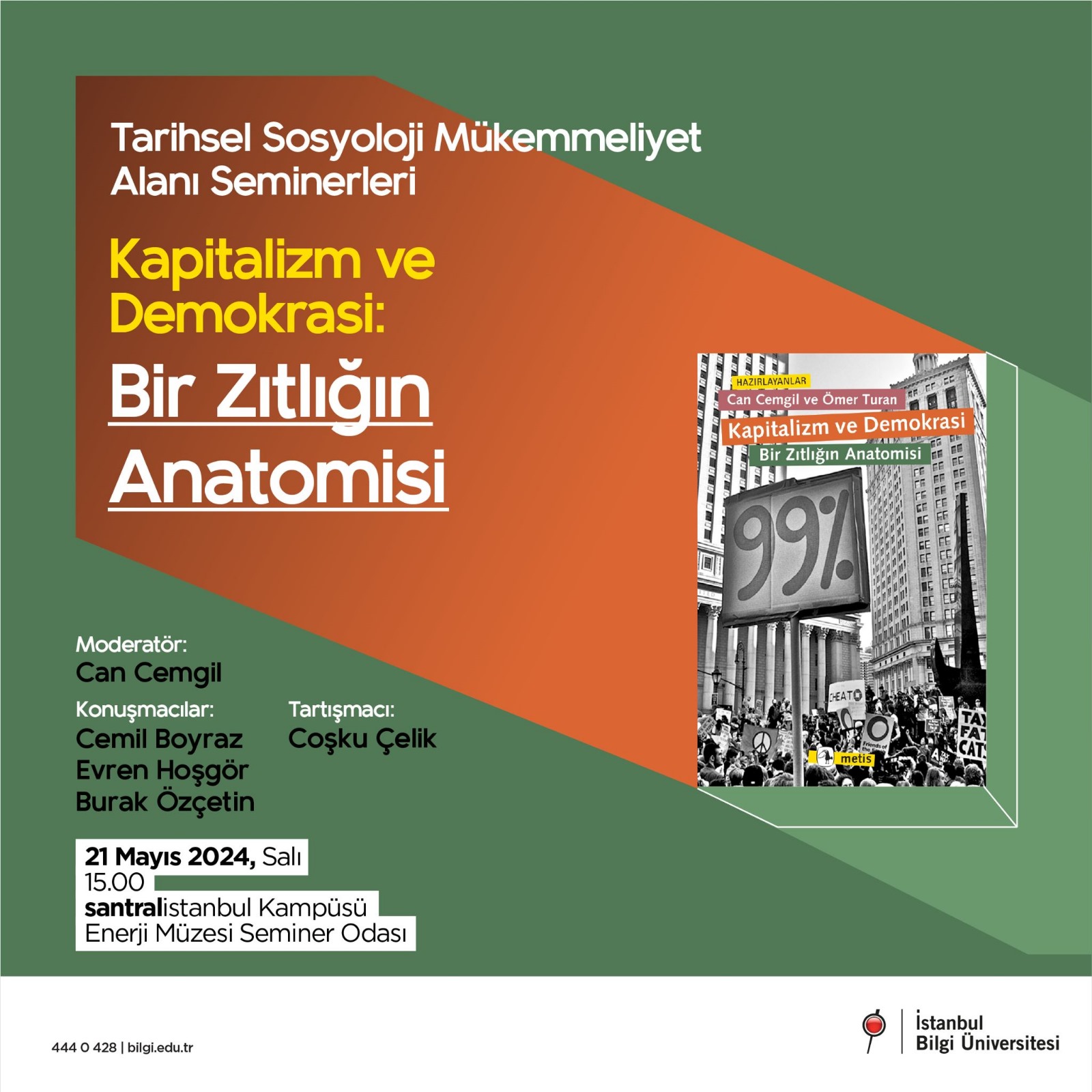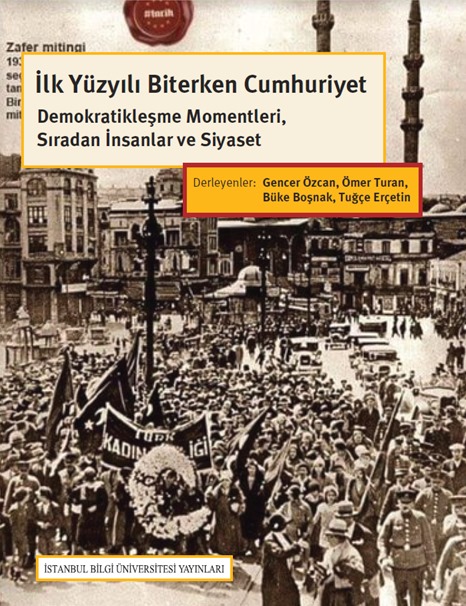Hoşgör, E. 'Yeni Yeşil Dünya Düzeni ve Ekolojik Emperyalizmin İnşası', Hukuk Defterleri, Sayı 22 Kasım / Aralık 2019, Çevre ve Hukuk özel sayısı.
1980’li yıllardan itibaren sermaye hareketlerinin küreselleşmesi uluslararası iş bölümünü radikal bir biçimde yeniden yapılandırmıştır. Ulus-ötesi şirketlerin çıkarları doğrultusunda sermaye kontrolleri zayıflatılmış, küresel üretim ve tedarik zincirleri oluşturulmuş ve ülkeler giderek artan bir ölçüde uluslararası rekabetçi baskılara maruz bırakılmıştır. Devletin kurumsal mimarisi de sermayenin uluslararası hareketlerini desteklemek üzere yeniden kurgulanmıştır. Özelleştirmeler ve emek piyasasını esnekleştirmeyi hedefleyen politikalarla birlikte bir bütün olarak değerlendirildiğinde neoliberal reformlar, sermayenin emeği ve diğer bağımlı sınıfları bütünüyle tahakküm altına alabilmesi için olanaklar yaratmış, güvencesizliği ve yoksulluğu artırmıştır. Ayrıca, sosyal harcamalarda nicel ve nitel erozyon ile kamusal hizmetlerin özelleştirilip, ticarileşmesine yol açmıştır. Bu sürecin bir diğer sonucu ise, sermayenin değerlenmesi için doğanın, kamusal alanların ve diğer müştereklerin metalaşmasıdır. Günümüzde kapitalist devletin sınıfsal karakterini iyice çıplaklaştıran mülksüzleştirme politikaları devam ederken, hammadde, toprak, su vb. yanı sıra bilgi, değerler, kültürel kimlikler dahil olmak üzere her şey metaya dönüşmekte, şiddetli çatışmaların nesnesi haline gelmektedir. Öte yandan, insan türünün doğa ile girdiği metabolik ilişkinin kırılması ve verimlilik artışına paralel olarak üretimin genişlemesiyle doğal kaynak ve enerji girdilerinin aşırı kullanımı sermaye birikimini uzun vadede olumsuz etkilemektedir. Kaldı ki son yıllarda dünya kapitalizminin içine girdiği ekonomik durgunluk, üretkenlik artışında yavaşlama ve birikim temposundaki önemli düşüşü beraberinde getirmiştir. Bu bağlamda, kapitalizmin sadece ekoloji karşıtı değil ekoloji yanlısı yeni kalkınma potansiyelleri içeren maddi dinamikler yarattığını söyleyebiliriz. Nitekim, son yıllarda neoliberalizmin ‘yaratıcı yıkıcılığına’ pansuman olarak yeşil birikim stratejileri öne çıkarılmaktadır.
Yeşil ekonomi çerçevesinde kurgulanan kalkınma modelinin ana hatları, ekolojik modernizasyona dayanan bir tekno-ekonomik paradigma, dolayısıyla arz-talep dengesini düzenleyen ve karların yeni sürdürülebilir yatırımlara aktarılmasına olanak tanıyan yeşile boyanmış bir birikim rejimi, toplumsal sınıfların bu yeni birikim rejimine uygun davranış kalıpları, normlar, değerler benimsemesini sağlayan kurumlar ve yöntemler setini barındıran bir düzenleme tarzı, küresel pazarlarda mal ve sermaye hareketlerini yeniden yapılandıran bir uluslararası rejim biçiminde özetlenebilir. Ekolojik modernizasyonun ulaşımdan imalat, tarım, enerji, inşaat, turizm, medya ile birçok servis hizmetine kadar uzanan geniş bir yelpazedeki sektörü canlandırarak sermayenin yeniden değerlenmesi için fırsatlar yaratacağı kesindir. Zira yeşil olmak çok uluslu şirketler tarafından oldukça karlı bir strateji olarak benimsenmektedir. Yatırımlar yeni finansman mekanizmaları gerektireceğinden ve tüketiciler çevreci tüketim kalıplarıyla teşvik edileceğinden, bankacılık ve finans sektörü bu dönüşümden karlı çıkacak ve yeşil kapitalizm de bir borç ekonomisi olarak gelişecektir. Ayrıca finansal piyasaların genişlemesinin ve sermayenin uluslararası bir ölçekte bütünleşmesinin farklı kâr olanakları yarattığını da söyleyebiliriz. Aşağıda detaylandırılacak olan karbon piyasaları aracılığıyla yürütülen emisyon ticareti bu alternatif yatırım fırsatlarını örnekler niteliktedir. Sonuçta yeşil kapitalizm, sermayenin tüm devrelerini yeni modelin düzlemine taşımak amacındadır.
Yeniden yapılanma süreci gelişmiş kapitalist ülkelerin hakimiyeti altında ilerlemekte; birikimin baskın tek bir ölçeğe bağlı kalmadan yeniden değerlendirilebilmesi için hem ekonomik coğrafya yeniden şekillendirilmekte hem de dönüşümün yasal ve kurumsal dayanakları oluşturulmaktadır. Yeşil dönüşüm küresel ölçekte birçok aranjman gerektireceğinden Dünya Bankası (DB), Ekonomik Kalkınma ve İşbirliği Örgütü (OECD), Birleşmiş Milletler (BM) gibi neoliberal agendanın taşıyıcısı olan ulus-üstü yapılar yeni iklim rejiminin inşasında ve sürdürülmesinde belirleyici olmaktadır. Çevre politikalarının tartışıldığı uluslararası zirveler (1992 Rio, 2009 Kopenhag, 2012 Rio ve 2015 Paris vb.) ise farklı coğrafyalardan benzer çıkarların bir dizi zımni veya açık ilke, norm, kural veya kurumsal mekanizmayla eşgüdümlenebileceği bir uluslararası rejiminin yapı taşlarını döşemektedir. Emisyon ticaretinin bizzat kendisi uluslararası bir düzlemde takip, dağıtım, kontrol standartları gerektiren bir sisteme dönüşmektedir. Düşük karbon ekonomisinin temellerini oluşturan ve iklim değişikliğiyle mücadeleyi serbest piyasa ekonomisi içerisinde yürütmeyi hedefleyen Kyoto Protokolü, Temiz Kalkınma Mekanizması, Ortak Uygulama ve Emisyon Ticareti gibi birçok enstrüman ile DB Karbon Finans Birimi ya da Uluslararası Emisyon Ticareti Birliği gibi kurumlar üretmiştir. 2015 Paris Anlaşması ise gelişmekte olan ülkelerin yeşil ekonomiye geçişinde işlevsel olacak Yeşil İklim Fonu adında yeni bir finansman aracı doğurmuştur. Bu ve benzeri araçların dayandığı neoliberal dengeleme (offset) mantığı karbon salımı yüksek olan gelişmiş ekonomilere emisyonlarını azaltacak yaptırımları dayatmaktan ziyade ödeyenin kirletmeye devam edebileceği bir dünya düzeni inşa etmektedir. Sonuçta, bütünleşik bir uluslararası çevre rejimi piyasacı kurumlara özgü mantık içeresinde şekillenmektedir.
Yeni yeşil dünya düzeni neoliberal politikalarla uyumlu olmanın yanı sıra küresel eşitsizlikleri yeniden üretmeye dönüktür. Gelişmiş ülkeler yaşam standartlarını korur ve gezegenin tüm doğal kaynak ve hammadde birikiminden yararlanırken, gelişmekte olan ülkelerin yavaş büyümenin bedelini üstleneceği yeni bir emperyalist stratejinin temelleri atılmaktadır. Bu savı doğrulayacak çeşitli olgular mevcuttur: İklim değişikliğiyle mücadele gerekçesiyle gelişmekte olan ülkelere uygulanan ticari tedbirler (karbon üst sınırı uygulamasında bulunmayan ürünlere sınır düzenleme vergisi, karbon vergisine yönelik yasa tasarıları vb.) bu eğilime örnek olarak gösterilebilir. REDD+’ın dengeleme mantığı ise gelişmiş ülkelerdeki şirketlerin gelişmekte olan ülke hükümetlerinden salım veya kirletme hakkı satın alabilmelerini mümkün kılmıştır.Karbon piyasalarında brokerlar ya da uluslararası finans kurumları aracılığıyla karbondioksit, metan ve diğer sera gazı emisyonlarını temsil eden sertifikalar (karbon kredileri) alınıp satılmaktadır. Doğayı kirletme (biyoçeşitlilik, hava ve su kirliliği) hakkının sertifikalandığı ve finansal bir ürüne dönüştüğü başka piyasalar da mevcuttur. Bu tür ekosistem piyasaları emtia borsalarına benzer şekilde işlemekte, fiyatlar arz-talep dengesine göre oluşmaktadır. Düzenleyici birimler tarafından belirlenen optimal kirlilik miktarları, şirketlere tanınan kirletme izinleri ve bunların alınır satılabilir izinlere (tradable permits) dönüşmesi de piyasacı uygulamalara örnektir. Böylece, karbon salımı ve kirliliği yüksek olan gelişmiş ekonomilerin büyümenin maliyetini piyasalar aracılığıyla gelişmekte olan ülkelere ihraç etmeleri mümkün olmaktadır.
Gelişmekte olan ülkelerin uluslararası kuruluşlar ve gelişmiş ülkelerden aldıkları ödenekler (iklim değişikliği ile mücadele adına dağıtılan fonlar) aracılığıyla belli sektörler ve ürünlerle rekabete zorlandıkları görülmektedir. Sonuç, gelişmekte olan ülkelerde monokültür üretim biçimlerini egemen kılmaktır. Bu tür politikaların başka sonuçları da vardır. Biyolojik çeşitlilik ve geleneksel, küçük ölçekli yerel ekonomiler (beraberinde topluluklar ve kültürler) yok olmakta, kırdan kente göç artmaktadır. Daha da önemlisi, yoksul ülkelerin kendi kendilerine yeterlilikleri azalmakta, bağımlılıkları pekişmektedir. Zira gelişmiş ülkeler temiz teknoloji kullanan sanayilere geçerken, çevreyi kirleten sanayiler ve atıklar yasal düzenlemelerin gevşek olduğu kirlilik cennetlerine kaydırabilecek, ekolojik sorunlar yoksul ülkelere ihraç edilebilecektir. Ancak su kaynaklarının kirlenmesinden, verimli toprakların gasp edilmesinden, tarımsal ürün fiyatlarının yükselmesinden, biyolojik çeşitliliğin azalmasından, meraların ve ormanların çokuluslu şirketler tarafından yağmalanmasından en çok etkilenenler, geçimleri bu ekosistemlere bağlı olan yoksul halklardır. Ayrıca temiz/yeşil teknolojiler yüksek yatırım oranları ile yeni üretim ve pazarlama teknikleri vb. gerektirdiğinden yeşil sektörlerde de sermayenin yoğunlaşması ve merkezileşmesi kaçınılmaz gözükmektedir. Doğal gıda firmaları örneğinde olduğu gibi gelişmekte olan ülkelerdeki küçük ölçekli üreticiler artan maliyetleri karşılayamamakta ve çoğu kez uluslararası tekeller tarafından yutulmaktadır. Benzer bir süreç enerji sektöründe halihazırda yaşanmaktadır. Son olarak, yoksul yerel toplulukları göçe zorlayan vahşi yaşamı koruma projeleri ile koruma altına alınmış bölgeleri uluslararası sermaye yatırımlarına (eko-turizme vb.) açan neoliberal korumacı politikalar da ekolojik emperyalizmin inşa edildiğine dair argümanları destekler niteliktedir. Uluslararası sermaye tekelleri yeniden üretim sürecinde yaşadıkları tıkanıklıkları piyasa mekanizmasıyla aşamadığı ölçüde, gelişmekte olan ülkelerin doğal zenginliklerini komprador hükümetler aracılığıyla ve siyasal zor yoluyla yağmalamaktadır.
Görüldüğü üzere yeşil dönüşüm yeni bir yasal ve politik çerçeve gerektirmektedir. Bu ise, sermayenin farklı ölçekleri ile bağımlı sınıflar arasında yeni bir ekonomik uzlaşmanın gerekliliğine işaret eder. Bu bağlamda, Yeşil Yeni Düzen gibi sol-Keynezyen alternatiflerde refah devletinin küresel çapta yeniden inşa edilmesini tasarlayan reform önerileri mevcuttur. Buna göre Kuzey ve Güney arasındaki eşitsiz gelişmeyi dengeleyecek, dönüşümün finansmanını sağlayacak uluslararası bir süper Wagner Kanunu (ve Marshall Planı) ve mevduat bankaları ile yatırım bankalarını ayıracak, böylece reel ekonomi ve finans arasındaki ilişkiyi düzenleyecek yeni bir Glass-Steagall Kanunu önerilmektedir. Kuşkusuz içinde yaşadığımız döneme özgü sınırlılıklar ve çelişkiler yeşil ekonominin hangi aktörler tarafından, nasıl bir çerçevede ele alınacağını belirleyecektir: Artı-değer oranları ve birikimin temposundaki düşüş, üretim faaliyetlerinin karlı bir alan olmaktan çıkması, dolayısıyla sermaye birikimin önceliklerinin giderek kısa dönemli ve riskli ancak yüksek getirili finansal varlıklar ve operasyonlarda toplanması, diğer taraftan sermayenin uluslararasılaşması ve sermaye üzerindeki rekabetçi baskıların artması vb. koşullar bu tarz bir kalkınma modeline ilişkin stratejik kavramlara, hesaplama tarzlarına, politik-söylemsel enstrümanlara yön vermektedir. Nitekim küresel finansal krizin yarattığı sınırlılıklar karşısında çevre korumasına dönük uygulamalar vergi, harç, katılma payı, emisyon ücreti ve kirletme bedeli alınması, çevresel etki değerlendirmesi gibi yerli ve yabancı sermayeyi ürkütmeyecek mekanizmaların ötesine geçememektedir. En radikal örnekleri, maddi tazminatlar, risk değerlendirmesine dayalı üretim sonu sistemleri gibi yatırımcılara ek maliyet ve limit getirmeyen düzenlemelerden ibarettir. Azgelişmiş ülkelerde yaygın olan çocuk işçi sorunu, düşük ücretler, taşeron uygulamaları ve güvencesizlik gibi toplumsal sorunlara ise değinilmemektedir. Bu tür sorunları giderecek yasal düzenlemeler, yeşil yatırımların önündeki teknik engeller olarak nitelendirilmektedir. Demek ki, toplumsal formasyonun bütün alanlarını etkileyebilecek organik bir kriz tehlikesi karşısında sınırlı yasal mekanizmalar ve palyatif düzenlemelerle kriz ötelenmeye çalışılmaktadır. Bu durum sermayenin uzun dönemli tavizlerine dayanan önerileri baskılarken, küresel ölçekteki eşitsizlikleri geri dönüşsüz bir noktaya doğru ilerletmektedir.

